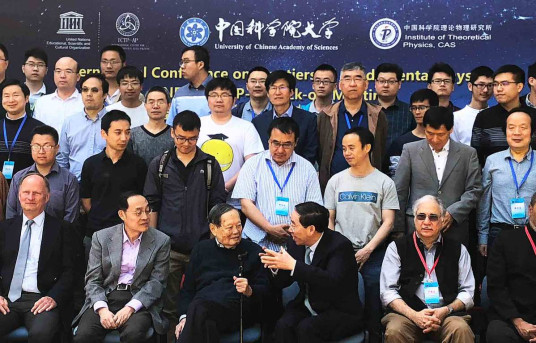New center seen as boosting regional scientific research
 |
|
Sitting at front are Chen-Ning Yang (third from left), a Nobel laureate and member of the Chinese Academy of Sciences, and Wu Yueliang (fourth from left), deputy principal of the University of the Chinese Academy of Sciences, along with others in attendance at the opening ceremony for the International Center for Theoretical Physics – Asia Pacific in Beijing on May 13. [Photo by Ye Zizhen/chinadaily.com.cn] |
The International Center for Theoretical Physics – Asia Pacific has opened in Beijing, giving a fillip to scientific research and collaboration in the Asia-Pacific region.
"Setting up this institute is a worthy idea," said Professor Chen-Ning Yang, a joint winner of the Nobel Prize in physics in 1957 and a member of the Chinese Academy of Sciences, at the inauguration ceremony on May 13 for the International Center for Theoretical Physics – Asia Pacific.
The center, a nonprofit organization located on the campus of the University of the Chinese Academy of Sciences in Beijing, aims to promote scientific research in the region and is recruiting researchers from home and abroad.
The International Center for Theoretical Physics, a research institute that runs under the auspices of UNESCO, was founded in Trieste, Italy, in 1964, after a proposal by Abdus Salam, a Pakistani theoretical physicist who was a joint winner of the Nobel Prize in physics in 1979.
Established six months ago, the new regional organization operates jointly with the University of the Chinese Academy of Sciences. It was set up with the support of UNESCO in conjunction with the academy, the National Science Foundation China and the Abdus Salam International Center for Theoretical Physics in Trieste.
Professor Quevedo Fernando of the University of Cambridge, director of the International Center for Theoretical Physics, said the center's mission is to promote the development of science and benefit more people. The new regional offshoot will contribute to fulfilling this mission, he said.
Professor Xie Xincheng, a member of the Chinese Academy of Sciences and deputy head of the National Science Foundation China, said the International Center for Theoretical Physics – Asia Pacific will function as a platform for young scientists to learn from each other, broaden their networks, enhance their research ability and disseminate the results of their research.
Those in attendance at the opening ceremony included scholars and professors of physics from Hong Kong and Beijing, students from the University of the Chinese Academy of Sciences, and staff of the International Center for Theoretical Physics – Asia Pacific.
